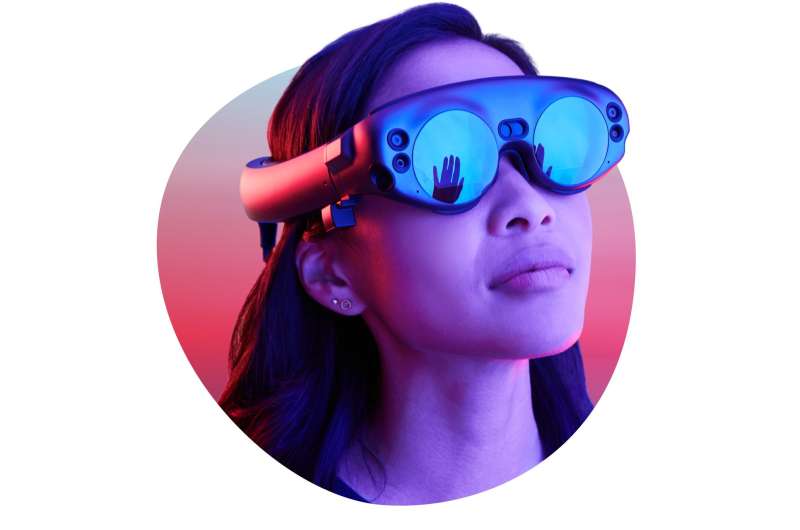Magic Leap One has finally launched.
After months of announcements, anticipation, and several online demo presentations that elicited mixed reviews, the secretive Plantation-based technology company has made its wearable computer available to the public in six cities including the Miami-area.
And the price is ... $2,295, according to Magicleap.com. For those who buy it, the company offers to "hand deliver the device to your doorstep and personally get you set up."
The launch began with Magic Leap founder and CEO Rony Abovitz tweeting a "Batman-light" style Magic Leap symbol, followed by a statement: "Florida has always been a blank canvas for innovation, and we hope to be one small part of that incredible story. Our launch of Magic Leap One Creator Edition begins the next chapter of our journey to empower creators in Florida, the U.S., and around the world. This is a joyful moment for all of our employees, and we look forward to working with a diverse and forward-thinking set of developers, artists, creators, and businesses right here in Florida and everywhere."
In an interview recently, Abovitz said Magic Leap One is basically a new, notebook-sized computer that can create digital experiences like people have seen in movies such as "Harry Potter" and "Blade Runner." The product has three components: a headset, computing pack and controller that places the digital world on top of the real world around the user.
Designed for "early adopters," including businesses and startup enterprises, developers, artists and filmmakers, the Magic Leap One offers technologies "you would find in satellites or self-driving cars," he said.
Eventually, the company will offer a mixed-reality experience for the cellphone through the company's partnership with AT&T, Abovitz said. AT&T is the exclusive carrier for Magic Leap One's consumer edition, according to a news release in mid-July.
Magic Leap plans to tour various cities and colleges in South Florida and throughout the country to allow every-day users to experience its first product, he said, though a schedule has not yet been set.
Abovitz said the Magic Leap One experience is very subjective. For some, the device will exceed their expectations, while "some people want to live 30 years from now right away," he said.
The product has been receiving mixed reviews.
"Magic Leap's technology was not convincing enough that I actually thought objects were in front of me, but did a good job of putting 3-D rendered objects into the world that weren't already there," said Todd Haselton, technology product editor for CNBC-TV, in a video showing him trying the device. Haselton was among the tech writers and bloggers invited to test the product before the launch.
Tech site The Verge, which has been critical of Magic Leap, wrote that the device is "an ambitious and well-built piece of hardware that's still held back by technical limitations."
After two online demos of the device on Twitch.tv, some fans found it cool while others expressed disappointment, saying they had hoped to learn more.
The world's biggest technology companies and investors have bet heavily on Magic Leap's success.
Magic Leap has topped venture capital lists in Florida, with total investments of more than $2 billion from companies including Google, Chinese e-commerce company Alibaba, and most recently, the Public Investment Fund, an investment arm of Saudi Arabia.
In 2016, Magic Leap was awarded more than $9 million in local and state government incentives for its investment in a Plantation headquarters and job creation.
With the launch of Magic Leap One, "I think we're validated," said Bob Swindell, president and CEO of the Greater Fort Lauderdale Alliance, the county's economic-development arm.
Magic Leap has raised Broward County's tech profile, he said.
Chris Fleck, vice president of mobility solutions for Fort Lauderdale-based Citrix Systems, South Florida's oldest homegrown technology company, said he's "excited about the launch of Magic Leap's augmented reality glasses, both for Citrix and the South Florida tech industry.
"For the local tech industry, it's another huge milestone beyond the IBM PC, and the first smartphone that was developed here in South Florida," he added.
Swindell said Abovitz told him early on in the venture that: "We're going against some of the largest companies in technology. It's not going to be easy."
Already on the market is Microsoft's HoloLens, a mixed-reality product that sells for $3,000 to $5,000, depending on the edition, according to Microsoft's website.
Magic Leap was founded in 2011 by local entrepreneur Abovitz, and in the past year moved into a former Motorola plant space in Plantation, where it has been developing and building the first shipments of Magic Leap One. The company also has locations in Los Angeles; Sunnyvale, Calif.; Seattle; Austin; Dallas; as well as in Switzerland, New Zealand and Israel.
Abovitz said the company's 1,500 employees around the world celebrated the launch with a party and a toast, with more than 1,000 employees watching orders roll in at the company's "mission control."
"It's a great moment for our company, especially to do this in South Florida," he said.
©2018 Sun Sentinel (Fort Lauderdale, Fla.)
Distributed by Tribune Content Agency, LLC.





















